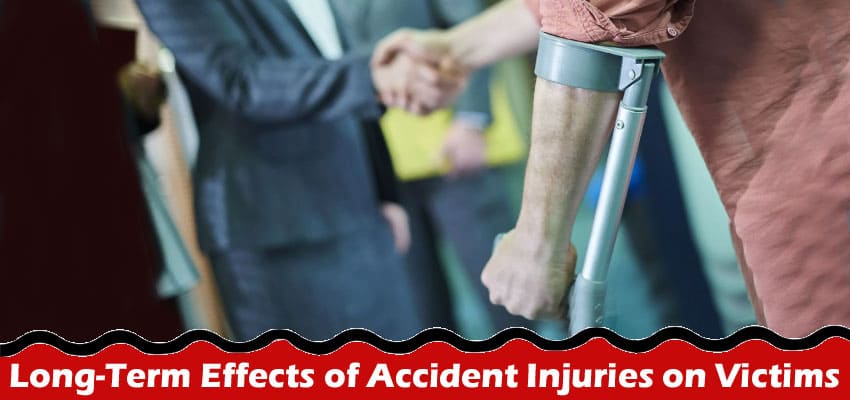Accidents can have a profound and lasting impact on the lives of those it affects, their friends and their families. Beyond the immediate physical and emotional toll, accident injuries can lead to long-term consequences that affect various aspects of life.
This article will look more in-depth at the long-term effects of accident injuries on victims and their families, shedding light on their challenges and the legal considerations involved. By understanding these long-term effects, we can better appreciate the importance of seeking proper medical care, pursuing legal recourse, and supporting the recovery and well-being of accident victims and their loved ones.
Legal Considerations and Seeking Compensation
Victims and their families may have legal options to seek compensation for the long-term effects of accident injuries. Understanding the personal injury claims process, the statute of limitations, and establishing liability are essential factors in pursuing the compensation they deserve.
- Personal injury claims: Accident victims can obtain compensation for the long-term effects of their injuries. Personal injury claims allow victims to hold responsible parties accountable for their negligence and recover damages for medical expenses, lost wages, pain and suffering, and other losses.
- Statute of limitations: It is important to stay within the statute of limitations to file a personal injury claim in your jurisdiction. Failing to meet the deadline may result in losing your right to seek compensation. Consulting with an experienced personal injury attorney ensures compliance with these legal timelines. Contact Whitley Law Firm for more information about the timeframe to file a claim.
- Establishing liability: Proving the responsible party’s liability is critical to a personal injury claim. This may involve gathering evidence, such as accident reports, witness statements, medical records, and expert opinions, to demonstrate that the other party’s negligence or wrongful actions caused the injuries and resulting long-term effects.
Physical and Emotional Effects on Victims
Accident injuries can have significant physical and emotional effects on victims, often leading to chronic pain, disability, reduced mobility, and emotional distress. These long-term consequences can impact their quality of life and require ongoing medical treatment and rehabilitation.
- Chronic pain and physical limitations: Serious accident injuries can result in chronic pain, disability, and physical limitations that can persist long after the accident. Victims may experience ongoing pain, reduced mobility, loss of functionality, and limitations in their daily activities. These physical effects can significantly impact their quality of life and require ongoing medical treatment and rehabilitation.
- Emotional and psychological distress: Accident injuries can also lead to emotional and psychological distress for victims. They may experience post-traumatic stress disorder (PTSD), anxiety, depression, and other mental health conditions due to the trauma they endured. These emotional and psychological effects can impact their ability to work, maintain relationships, and engage in daily activities.
- Impact on daily functioning: Long-term injuries can disrupt the victim’s ability to perform routine tasks and engage in activities they once enjoyed. Simple activities like walking, driving, or participating in hobbies may become challenging or impossible. The loss of independence and diminished quality of life can affect the victim’s emotional well-being and relationships with family and friends.
Financial Consequences for Victims and Their Families
Injuries from accidents can result in substantial financial burdens for victims and their families. Here are some issues that can arise.
- Medical expenses: Long-term accident injuries often require extensive medical treatment, including surgeries, rehabilitation, medication, and ongoing therapy. These medical expenses can be substantial and may burden the victim and their family, especially if the injuries result in a loss of income.
- Loss of income and reduced earning capacity: When accident injuries lead to a temporary or permanent inability to work, victims may lose income. This can create a financial strain for the individual and their family, impacting their ability to cover daily living expenses, medical bills, and other financial obligations. In some cases, the victim may experience a reduced earning capacity even if they can return to work due to physical limitations or other factors.
- Caregiver burden: For severe accident injuries that require ongoing care and assistance, family members may take on the role of caregivers. This responsibility can be physically, emotionally, and financially demanding, as caregivers often have to balance their commitments and may need to make sacrifices to provide the necessary support.
Supporting Recovery and Well-being
Supporting the recovery and well-being of accident victims and their families involves accessing appropriate recovery. To do so, the following is needed.
- Medical treatment and rehabilitation: Seeking appropriate medical treatment and following recommended rehabilitation plans is crucial for the long-term recovery of accident victims. This may involve working with various healthcare professionals, including doctors, specialists, therapists, and counselors, to address the injuries’ physical, emotional, and psychological effects.
- Emotional and social support: Emotional support from family, friends, and support groups can play a vital role in helping accident victims and their families cope with the long-term effects of injuries. Encouraging open communication, understanding, and empathy can create a supportive environment for their emotional well-being.
- Rehabilitation services and vocational support: Access to rehabilitation services, vocational training, and job placement assistance can help accident victims regain independence, improve their quality of life, and reintegrate into the workforce if possible. These resources can provide valuable support for their physical and financial recovery.
Minimize the Long Term Effects Of Injuries
The long-term effects of accident injuries on victims and their families are multifaceted and can greatly impact various aspects of life. By advocating for their rights, seeking compensation, and accessing the necessary resources, individuals can navigate the challenges and work towards rebuilding their lives after sustaining long-term injuries in an accident.


